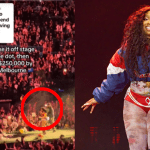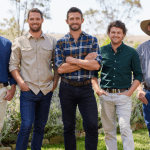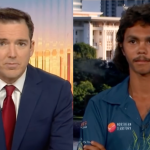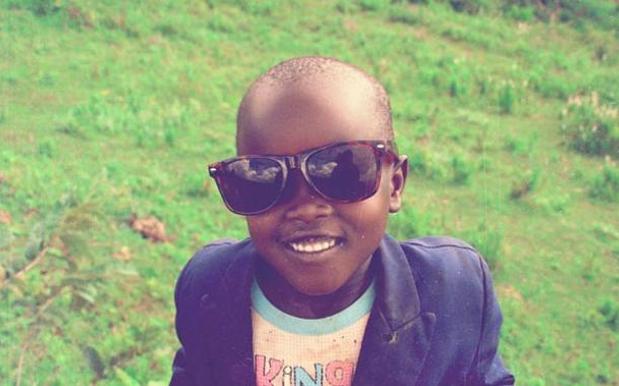
Jinja Safari’s Marcus wrote this amazing guest post from his travels to Uganda. He “steals” the locals’ music on a recorder to sample on the next Jinja Safari record while experiencing the culture, learning the history, and meeting the people of the country. We were expecting a few LOLs and some happy snaps. Instead Marcus provided us with a fascinating insight into an extraordinary country with a troubled history. He met the people and tells their stories. It made us stop bemoaning our faded spray tans and champagne hangovers and get some much-needed perspective…
I went to Uganda for a few reasons. Partly because I got a good tax return and didn’t want to waste it on a new pair of skate shoes and a cool new cap (incidentally, I got both of these items at knock off markets in Jinja!). It was partly to meet my grandma and partly to experience the poverty of a developing nation first hand. And maybe it was also partly because I always felt like a bit of a fraud – calling my band after a town I had never been to (Jinja, Uganda), referencing a grandmother I never knew and stealing the rhythms and melodies of a culture I know nothing about.
‘Mzungus‘ like me (white folk in east Africa) have been borrowing from African music in western pop music culture for generations – even in the 1950s when Rhythm and Blues was becoming a little more commercially acceptable. There were the famous white Blues artists that kids were allowed to listen to, but then there was the ‘other stuff’ that they kept under their beds for when the parents were out: Muddy waters, Howlin Wolf and Robert Johnson.
Mzungus stole, and we continue to steal (or borrow) without giving credit to the people or the hardship that has gone into creating these sounds originally. So here are a couple of faces and stories I heard and met during my three week trip knocking around Uganda. I didn’t expect to be so moved, ecstatic, confused, connected, and bitter toward the people and plights of another country. Everything that I write here is purely my opinion and a reflection of what I saw.
Here are some orphan kids busking, with their teachers rocking the homemade marimba. Essentially just banging wood together to create a vast array of different tones and dynamic range. You might hear this on our CD – I sneaked a recording and gave them a dollar.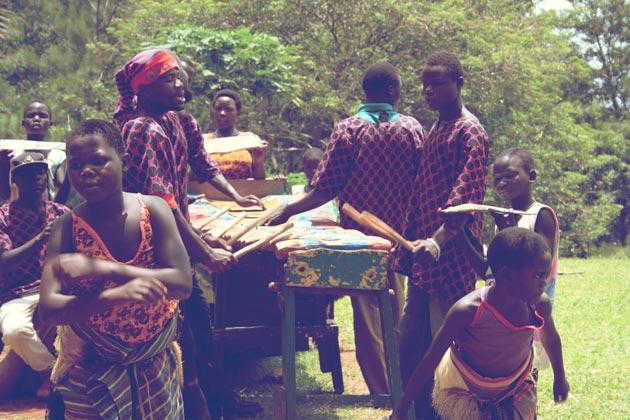
Pick the Mzungu stealing riffs from schoolgirls below. These girls said they were going to perform one song, but I think it was a mash up of a few classics. The timing and rhythms are mind blowing, and the fact that all the girls knew exactly what to do within the complicated poly-rhythms.
The final sequence of the song was called “Acara Anongo Won Ker”, which is a song to welcome a new king. By this point all the girls were covered in dust and sweat, and really banged out this song. It was an intense call-and-response with slamming drums. I was surprised at how intense things got for 7am. It sounded suspiciously like something by The Police or Animal Collective – even though this song has been sung in the village for generations.
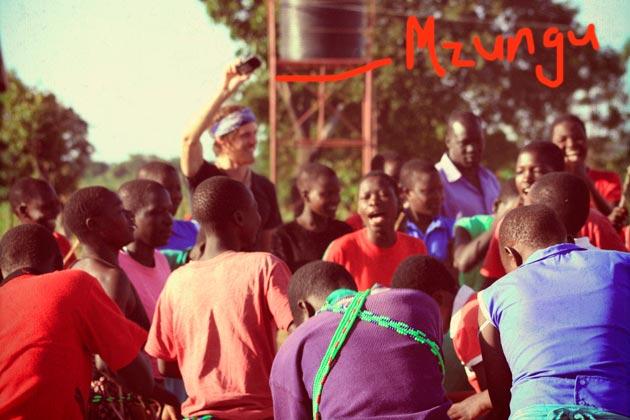
This is the Pader Girl’s Academy, founded by Alice Achan in 2002. Pader is in Northern Uganda – not far from the South Sudan border, and a nine-hour bus ride from the capital of Kampala.
Pader was a distribution point for NGOs (Non-Government Organisations) during the height of the war. Up until the year before last I had no idea that there had even been a war in Northern Uganda, much less the atrocities that had taken place.
Alice is an incredible character to meet and one of the first examples I met of Ugandan’s taking responsibility for Uganda. She started this Academy to look after young mothers who became pregnant after being raped by LRA soldiers. Often, the young girls are subsequently rejected by their communities and forced out to look after themselves and their child.
Apart from the schooling, accommodation, medical assistance, that Alice offers the young mothers, one of her big tasks is creating a bond between the mother a child. There are many cases where the mothers hold resentment towards the child, who is a constant reminder of a painful memory that would much sooner forget.
Alice has had a lasting effect on countless lives. But, most importantly, Alice is thinking of the future – not just giving money to a problem but teaching the girls how to become independent from outside sources.
The war may be over, but the repercussions will be felt throughout generations. And people like Alice are responsible for bringing healing to a place that seemed beyond repair.
Alice: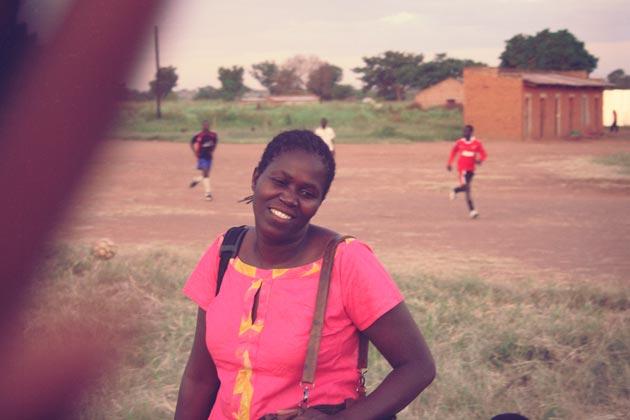
The girls got up at 6.30 am to perform for us. This girl’s Djembe had a loose skin so they poured water over it and held it over the fire to tighten it up.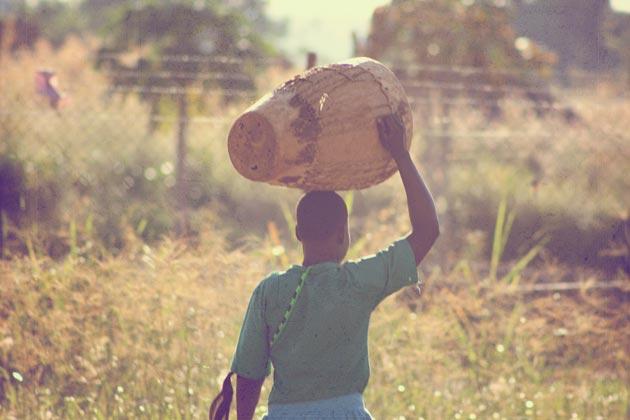
This photo reminded me of Abbey Road. The East African Beatles.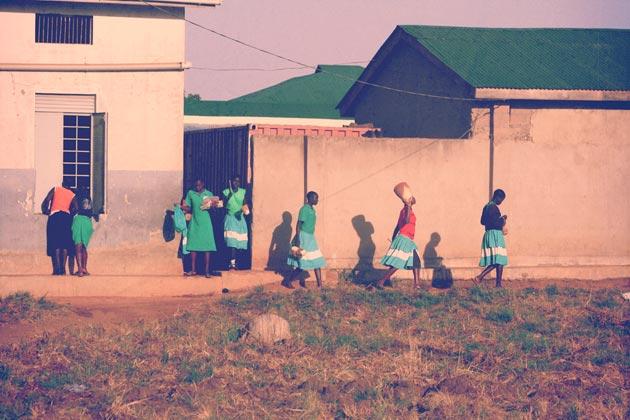
This is Polline. She was taken from her village by the LRA in her early teens, marched day and night through Northern Uganda into the Sudan desert and given to an older gentleman in Joseph Kony’s camp.
She became pregnant, and due to her age and the lack of proper medical assistance, she went into labour for two weeks. Eventually the baby died and she also came close to death. She begged the man who got her pregnant to take her out to the bush and finish her off, but he was determined to see her live. So they got a bread knife, cut into her torso and removed the child from her womb and disposed of it in the bush. They had nothing to sew Polline up with, so they packed and wrapped the wound with tea towels and left her for another couple of weeks.
This came at a time where peace negotiations had been taking place between Kony and the Musevini government. It was agreed that Polline would travel down to Kenya for treatment and she would be returned to the camp after, but Polline had other ideas. She escaped the hospital staff, fleeing with a concealed passport back up to Northern Uganda where she met Alice.
Polline: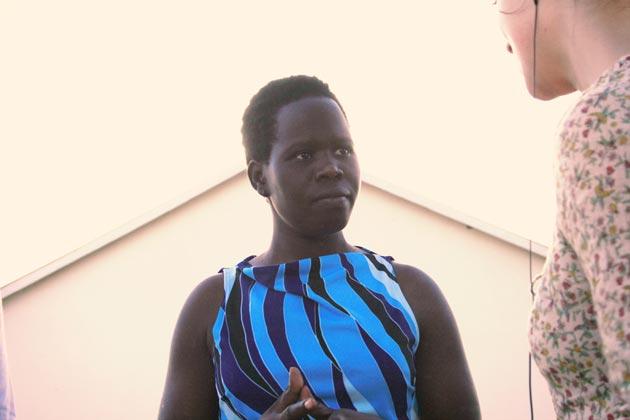
Kids jamming out a Djembe in the Jinja ghetto.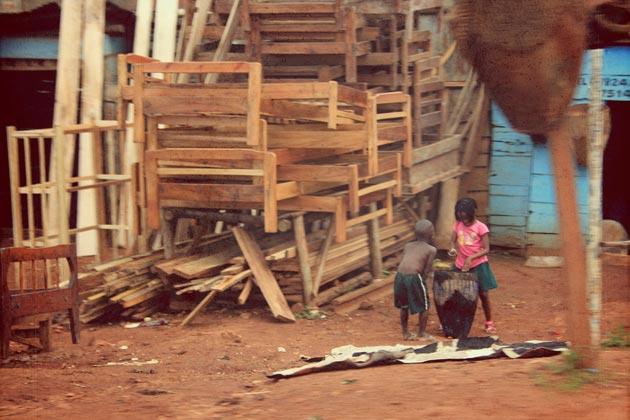
Every person you speak to in the north has another story that serves to witness just how far mankind can slump. Any of these children have stories that can honestly make a Hollywood horror film script seem like a sugary soap opera. But these lives aren’t fiction, and there is no escapism or Disney endings. When people here finish sharing their stories they leave to walk home to what is left of their farms.
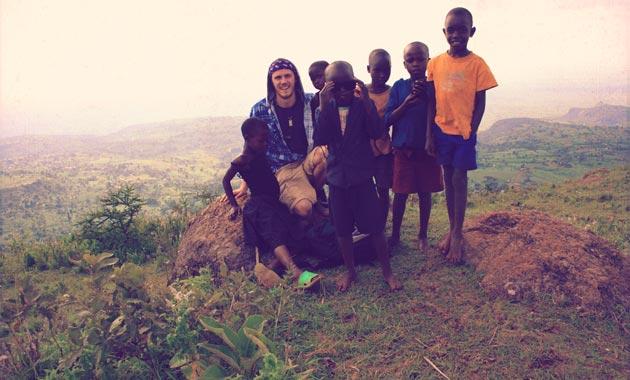
Over the past three years, a large majority of the families in IDP and Refugee camps have been coming home to their land which was pillaged by LRA soldiers.
It is beyond me as to how anyone could possibly muster up the brass to start again after having lives of loved ones taken, pride removed, and cultural identity twisted.
Babies in the water pump, children forced to cut the limbs off their family members, forced cannibalism, cutting the lips off villagers to give them the ‘eternal smile’… And that’s not even scratching the surface. If you want to know the facts on the war crimes committed by LRA soldiers, take one trip to WIKI for a basic rundown. It’s a fascinating and horrific back story.
My grandmother adopted a boy when he was 15. He was a member of a rebel gurerilla group in the north known as the ‘holy spirit movemenent’. This was basically a Christian militia, formed by Alice Auma, and her guiding spirit ‘lakwena’, together they were known as alice lakwena. Alice Lakwena was a spiritual guide, spokesperson for the holy spirit, turned military commander, whose initial intention was to stop the bloodshed involved in the north and take down the musevini government.
The stories surrounding her life, and leadership during battles are already local folklore. There was a strong spiritual superstition attatched to her army, which followed them as they marched toward kampala to topple the Ugandan government. The holy spirit movement were defeated in a battle near Jinja in 1987 (the year I was born), and Alice fled to a Kenyan refugee camp, claming her spirit guide ‘Lakwena’, had left her. From here Joseph Kony took control and gave birth to the Lords Resistance Army, responsible for countless war crimes, and lost any origional ambition or political ideals, and pillaged the surrounding countries for the next 20 years.
1987 was around the time that my grandmother met this young boy David, who had been arrested in the bush and had been brought to kampala for prosecution. During transportation, david and few friends escaped, and through a serious of fortunate events, David ended up in a local church, and was soon introduced to my grandmother. He eventually took her name, and was legally adopted. So, effectively he is my Uncle. This was my first time meeting him and hearing a few of his stories. He runs a church and radio station, in kitgum, and was kind enough to have me stay at his house with his family. He showed me the bullet holes, in and around his house, reminders of the not so distant war.
David, Alice Achan (founder of PDA), and Jomine who was had come up north to make a documentary about Alice and the PDA.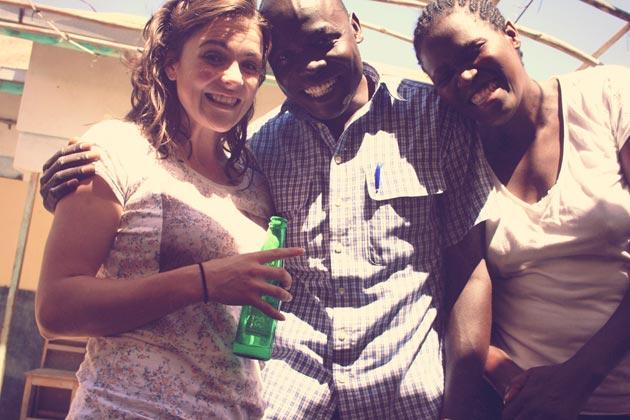
This is David’s son Emmanuel. My cousin. He didn’t like me at first. But after he showed me his toy collection, and I showed him my camera, we became best of mates. Even though, they kept telling me we weren’t blood relatives, I think we had a similar look, and I choose to believe we are both fruit from the seed of the same tree many many moons ago.
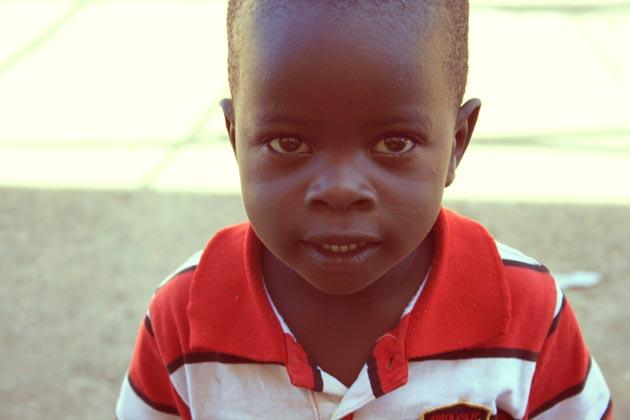
Emmy and I, and some other guy.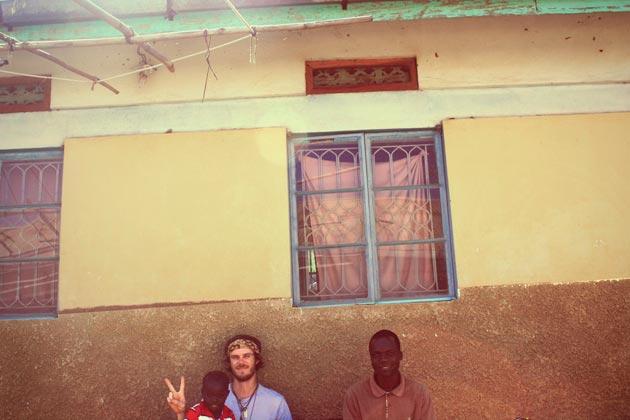
Also, david showed me his giant radio station building, which stands on the top of the hill as a beacon that shines a light, both of a white elephant, and of the insecurity of NGO support. This was my first introduction into the floors of major NGOs, and more specifically, the subsequent cultural floors of Ugandan identity, whereby they rely on western organizations to sustain their lives. So much money was put into the creation of this radio station, but without the constant support from the outside sources, it cannot maintain itself. And I think that this is a image that symbolizes a real problem.
Western people feel guilty for their blessed lives, so are happy to give money, without looking at where its going or what its being used for. Particularly when it is a well respected, international, globally praised NGO. They money gets sunk into building some infrastructure that looks and sounds fantastic, but in reality, may be culturally, or socio-economically, irrelevant. And then, creates just another gap that western funding must fill to maintain its progress. This in turn creates a very sad, dependent attitude forwarding the general contention felt throughout Uganda- that white men are rich and the black man is poor. This may be true, but just because the black man is poor, does NOT mean he is hopeless.
In the north of Uganda, NGOs have created a fantastic support network of medical, food and shelter to those effect by the war. But now that the war is over, and the NGOs have packed up, leaving their building to stand like tombstones in a deserted town. Who is going to support these people now? They are returning to their farms, but it is so much effort to rebuild, and it was so much each being hand fed in the IDP camps.
The NGOs have, in some cases, unwittingly created a dependence. And despite of all the amazing work they have done, they have added to a new issue of building a nation constantly holding out its hand. This is an incredibly insure way to live. What happens when the funding dries up.
When western investors loose interest, or start to realize that they have been sinking money into a void; a black hole that is effectively a temporary band aid solution, that helps to ease the pain for a moment, but inevitably, doesn’t answer any questions as to how a nation can rebuild itself and stand on its own two legs. Ugandan’s are hard workers, and incredibly resourceful. So it really is a crime, to throw money at a problem, without thinking about the process of creating a sustainable future.
Micro- Finance are the two words that came into my peripherals on this trip that gave me hope for Uganda, and other third world nations. Organizations like Opportunity International have created a format where small loans of around 100 AUD are given out, and are repaid with interest. The repayment rate is 97%, and in some countries it is as high as 100%.
This is Phillipa Tyndale. She has partnered with Opportunity International, and has been involved as an advocate for mirco-finance in the phillipines, India and east Africa. She also knew me before I was born, and coincidently happened to be in kampala when I was passing through. She was the reason I went to Pader, and invited me to tag along and see the work they were doing. For more information on this NGO that has gone to great lengths to create a foundation which stimulates independence, check out Opportunity International.
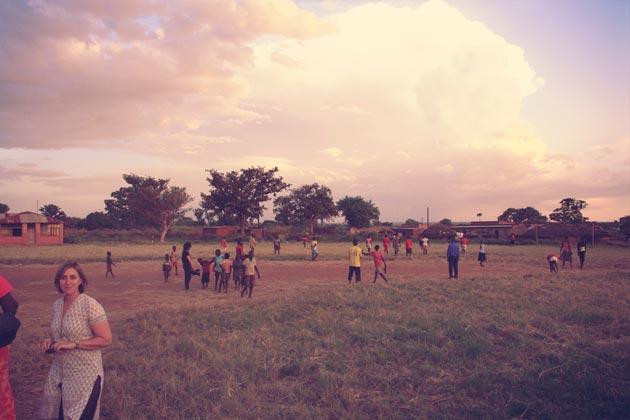
Uganda has so much untapped potential for its export market. It has a lush tropical landscape of fertile plains and mountain ranges. And during the dry season there is the opportunity of creating world class irrigation by taking advantage of the Nile. A powerful, resource that works its way through the country.
The people know agriculture- farming and crop cultivation is part of their DNA, and is still taught at many schools. Their mangos, pineapples, guavas are everywhere, and grow with very little cultivation.They could export these fruits to other countries and create countless jobs in juice factories and fruit farms. But It takes government initiative, and not just a westerner coming in, to throw money at the idea. It takes a lower trade import tax in European countries. Save your money, put it towards campaigning with companies set up to establish fair trade prices, to remove tax hurdles that places like Uganda could never compete with.
I went past a big factory, and found out it was a Chinese plastic plant, where they paid Ugandan workers around 1.50 AUD a day. I don’t think slavery was abolished, I think we simply changed its name. There is so much more potential for these workers. It is so easy for the Ugandan government to accept the tax revenue from a major Chinese plastic company, in return for exploiting their village people. But how long can this last?
Farmland bought for AUS 300 bucks. Used to grow corn.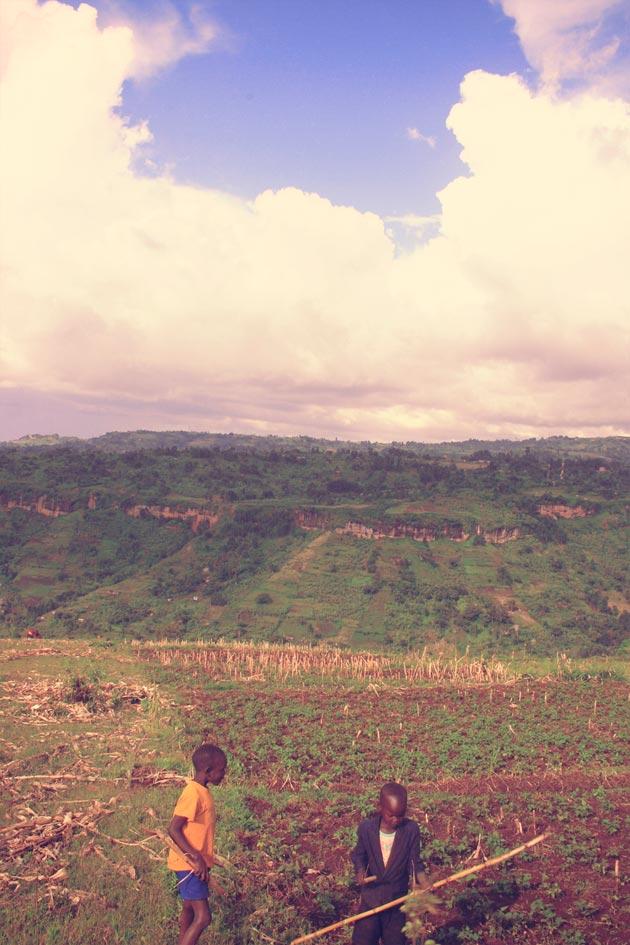
Idi Amin sent Uganda back to the stone age, and there has been very few political leaders since him that have done anything to resolve this. From what I can see and from my time talking to people in Uganda, the only leaders that make it into a place of political power in Uganda are the loud, brash, obnoxious bullies, who simply intimidate their way to the top. Fat cats get fatter, slims get malaria. A majority of the villagers still live in mud huts, with three stone cooking, and a Friesian cow as their only form of assets or savings (if they are lucky).
I have spent a lot of time hanging out of the window of a public transport bus heading north. I took the 9 hour trip twice, so I had a lot of time to think. And I kept thinking that Uganda doesn’t need another military, or fast talking, charismatic political leader.
They need someone who cares about the villages. I kept thinking about a leader like ghandi, or Mandela, who found other, non physical forms of power and strength. Then I met Steven Othien.
Steven started a school just out of Jinja, called lakeside school. He basically works with the local community to find the really gifted kids, who want to study, and pays for their tuition. He works three days at this school and then works another two days at a government school, to support his income. I met him a bar, watching the English premier league. He is a mad Arsenal fan, and was very emotional that night after the loss to Tottenham.
Steven was at the top of his class during high school and he received a scholarship to study at university. However at the last minute, his overseas sponsor pulled out, leaving him stranded. He worked extra hard as a result, teaching at a community college, while he was at university, to pay for his fees. He said he would make it his mission in life to ensure that none of the children he met would have to endure what he went through. So he now has a school of 60 children, with 3 staff members, funded entirely by himself and the small amount of school fees the community could muster together. I had such a great time hearing about his experiences at the bar, he invited me to come out and see his school. I felt very humbled, meeting some of these intellectually advanced, poverty sticken children.
The school was really nothing more than a cow-shed with desks. There had been a storm the previous week, and had blown the roof off, and you can see that they have replaced it with palm leaves.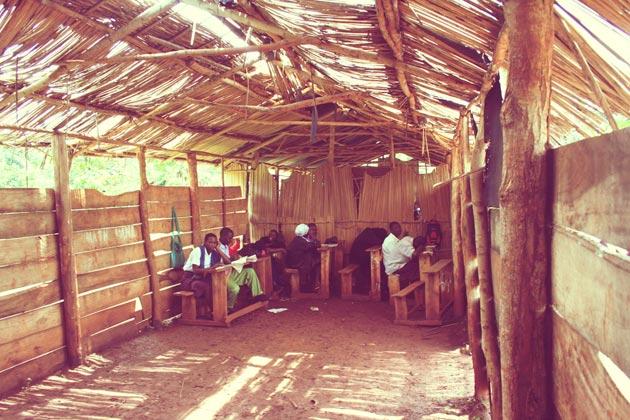
Interestingly enough, steven was one of the only Ugandans I met, who didn’t ask me for money. If ever you wanted an example of Ugandans taking responsibility of Uganda, Steven’s your man.
Steven on the blower in front of the school he built. A nation of contradictions.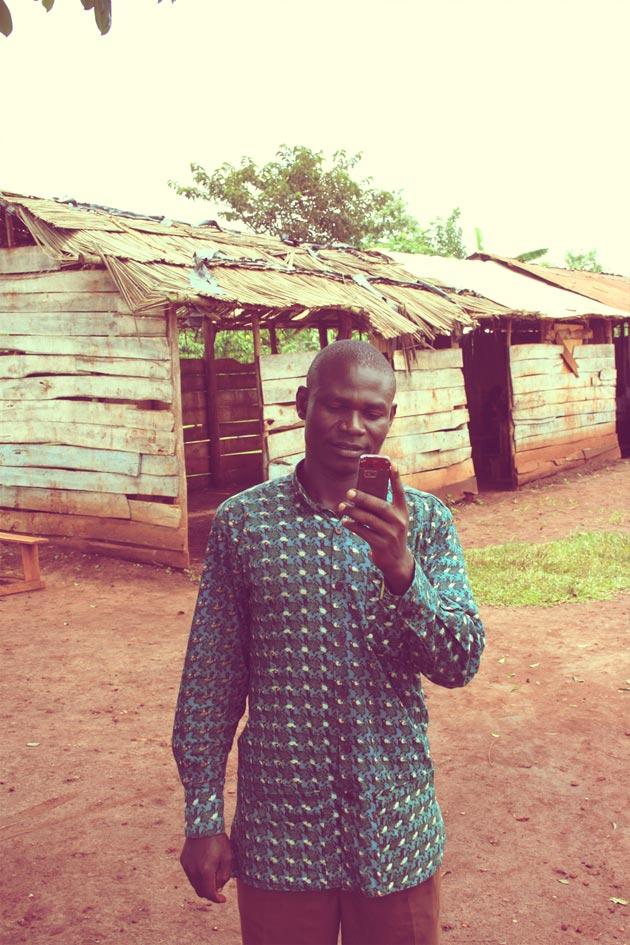
Steven with some of his best students. He pays the school fees for all these students.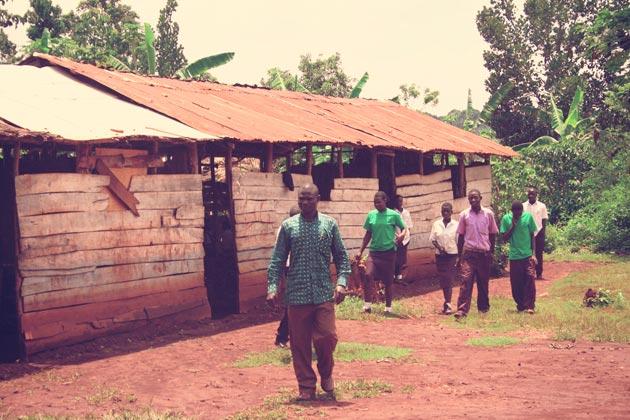
When I got back Australia, I was catching a train home and I heard a kid complaining about the lunch his mother made him. I met kids in the Ghetto of Jinja who work the whole weekend doing manual labor, or tour guiding to get enough money to pay for the next weeks school fees. They live in corrugated iron huts by the lake, with no electricity, welfare support, no parents, and constant threat of disease. But at least they don’t get the wrong jam on their sandwiches.
Jr.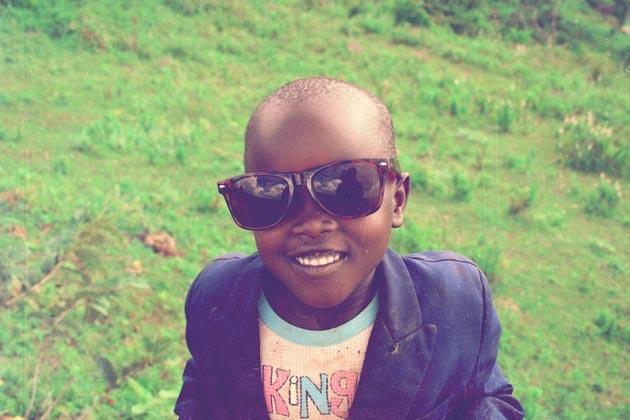
The kids stole my WAV recorder and made a whole bunch of whistling recordings IMG 3063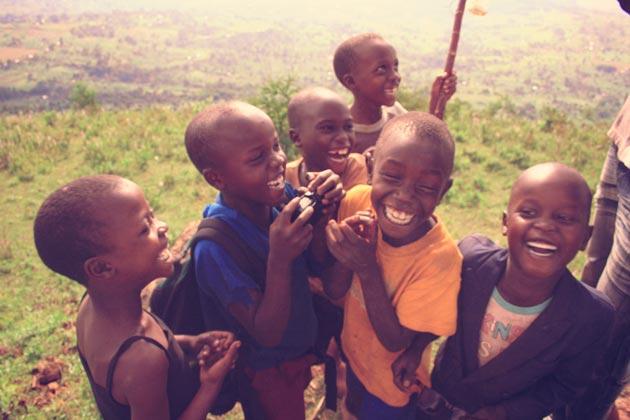
Barber shop.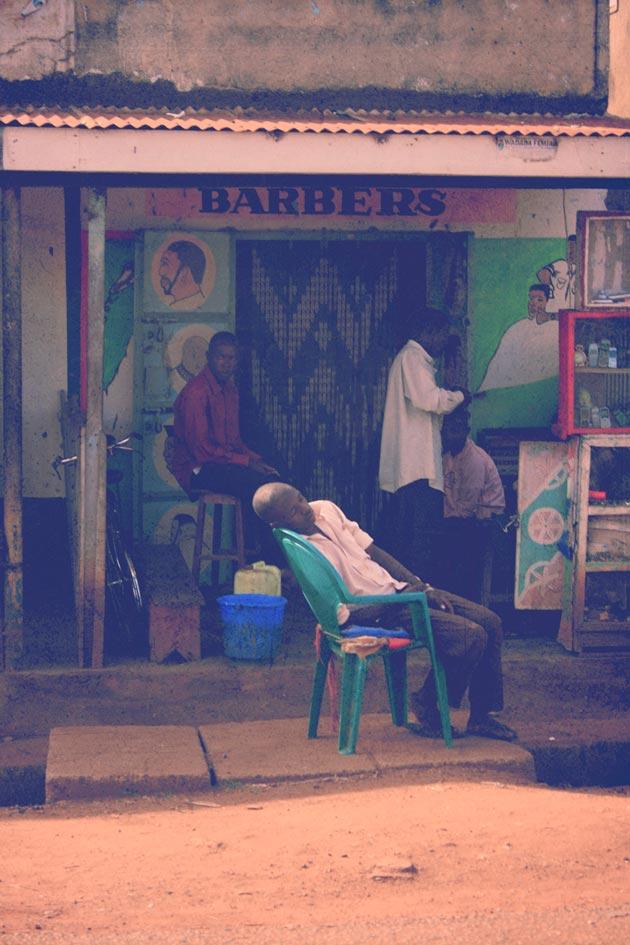
Jinja. Some of the kids are terrified by the mzungus. You can see the fear in the little ones eyes. A lot of the older kids tell the little ones stories of the big white ghost spirit Mzungus who come into the village to eat little kids. You can see this one believed the hype.
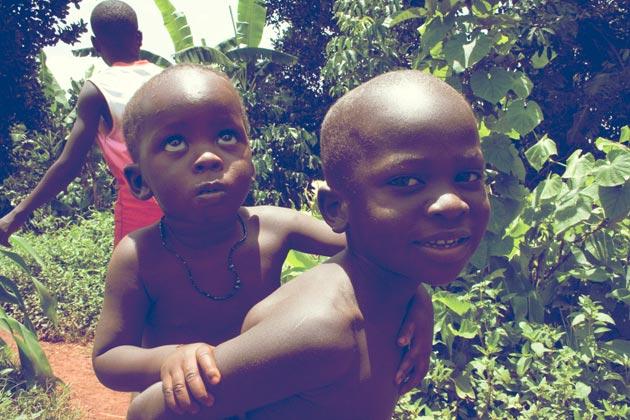
The girl on the far right left an impression on me. She was posing like a vogue model for the camera, and was full of life. I found out after that she is HIV positive, as a result of an unfaithful father. Born with the disease, Susan takes a tablet morning and night, with a checkup every 2 months. This was she can live a completely normal life. I had many ignorant prejudices toward disease. But after playing with HIV kids, shaking a lepers hand, and realizing that maliaria is as common as the flu over there, I began to think how sheltered we are in Australia. Medical science has come so far, and even though there is no cure for HIV, there are actions that can take place to ensure a long and happy life.
Susan: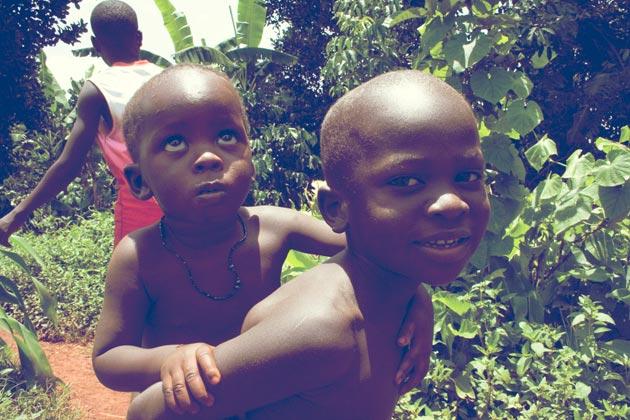
Oh yeah, Jinja’s pretty cool. Tourist destination! Adrenalin capital of Uganda! Bungee, rafting, kayaking, horse safaris, motobike safaris, and heaps of other fun stuff. Just try to ignore the blaringly obvious contradiction of slums and street kids juxtaposed with the hootin an’ hollorin of backpackers having the time of their life, rafting on the Nile.
Spending the equivalent of 6 month local wages on a day of frivolity. For me, it kinda took the air outta my raft. So you can imagine my response when I hear an interviewer ask ‘so, did you actually go on a Jinja Safari?’…No. But you should! Go there! Actually Ghandi [the Ghandi went there a few years ago, and there’s a plaque by the Nile to back up that claim.
Also, it is the true ‘source’ of the Nile. Underground springs at the source travel all the way to the Mediterranean from Jinja. So… Go there. Do touristy stuff. It’s all fun. And go to my grandma’s café – Ozzies.
And here is a floating monkey I saw: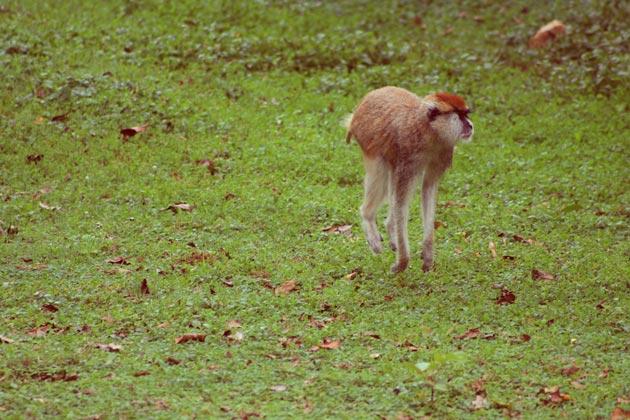
Jinja Safari’s ‘Locked By Land’ Tour kicks off next week and is proudly presented by Pedestrian. Get all the details HERE.
If you’ve been around the world like Puffy and want to share your stories on Pedestrian just drop us a line.
All Photos Provided by Jinja Safari’s Marcus

